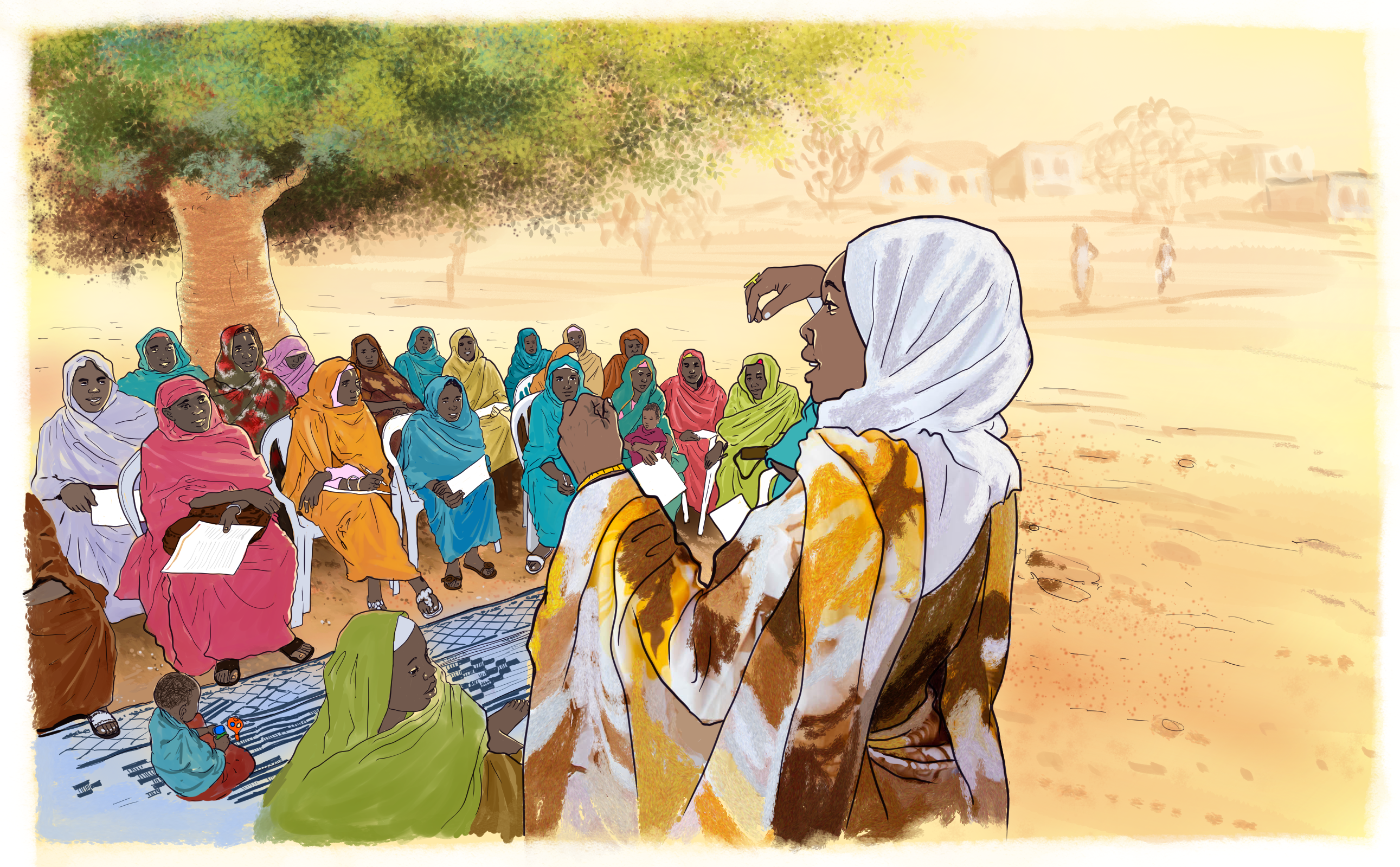In the words of *Axado: Women’s empowerment is key to building a sustainable Sudan.
Date:

Axado* is a women’s rights activist and peace advocate. She is an active member of different women-led groups and other initiatives working against the ongoing war in Sudan. In addition to advocating for peace, these initiatives focus on service provision to internally displaced persons, and humanitarian capacity building. Over 168,000 families were estimated to be displaced across Sudan after one month of conflict, with the highest numbers reported in the Northern State where she resides.
Women and girls in need
The situation in the Northern State is relatively safe. There is no active conflict in the state. However, there are many displaced people, which has led to a significant deterioration in services and infrastructure and a shortage of life-saving medicines. Houses within the state may not be good living conditions for the IDPs as they lack necessities.
Women are responsible for providing food items as well as reproductive health necessities that are not available in the state. Women and girls in the community are in urgent need of psychological support, as families have lost many of their children, and this is the first time that the people are witnessing an armed conflict. Displaced people are subject to trauma.
Women do not have equal opportunities to work, and they suffer from very high levels of poverty. In this conflict, women have also lost jobs and educational opportunities. There is a need for providing economic opportunities to support displaced women and girls and the community at large and to save the state from possible famine, especially with the interruption of supplies and poor production.
Women’s political participation
Unfortunately, in the Northern State, women did not participate in political processes prior to 2018. After the Sudanese revolution, a group of young women played a key role in enhancing women's political participation and raising their awareness of political processes.
Currently, many women cannot make the decisions about their own lives, whether to flee and seek asylum or stay, and they are not allowed to participate in gatherings outside their homes. Women activists are now engaged in providing housing, food, medicine, transportation for the displaced, and psychological support and health services. They are also working to raise women's awareness about the war and their rights within the conflict context and organizing to give women an active role in political decisions.
In general, the systematic marginalization of this region has weakened the political participation of people of all genders.
Cases of sexual and gender-based violence
As far as I know, there are no sexual violation cases reported to have occurred in the Northern State. However, several displaced women who were subjected to sexual assault were given medical care in the state. Generally, there are many reported cases of sexual violence against women and girls in Khartoum and other states. We refuse the exploitation of women's bodies and the use of sexual violence as a weapon of war.
“Peace for Sudan” platform priorities
The “Peace for Sudan” platform, supported by UN Women Sudan, coordinates women-led initiatives in all states of Sudan and facilitates communication among them for collective advocacy efforts. Unifying efforts and demands at this stage will be very critical.
The platform’s priorities include:
- Achieving comprehensive peace, starting with a commitment to the cessation of hostilities.
- Opening safe passages for humanitarian relief.
- Monitoring humanitarian needs and providing aid.
- Responding to demands for the release of prisoners, detainees, and captives.
- Protection of women and girls, including stopping child recruitment and engaging child soldiers in rehabilitation programs.
- Ensuring the continuity of the educational process and securing health services.
- Monitoring human rights violations committed by conflicting parties.
- Supporting the women and girls who are victims of GBV by advocating for the establishment of a safe house for women.
- Spreading the culture of peace through awareness-raising activities and campaigns in which the values of coexistence, tolerance, and reconciliation are spread among the Sudanese people.
- Reaching minimum common demands for women.
- Enhancing women’s political participation.
Peace for Sudan’s work will be in two phases, the first during the war and the second after its resolution. After the war, efforts will focus on developing strategic plans to ensure continuing support for women.
The international community has a role to play in supporting organizations and youth actors in humanitarian actions and recovery. As the most affected group, it is important to engage women in all processes. Humanitarian aid is a priority at this stage; however, women’s empowerment is key to building a sustainable Sudan.
The views expressed in this article are those of the author and may not necessarily reflect those of UN Women.
*Name changed to protect her privacy